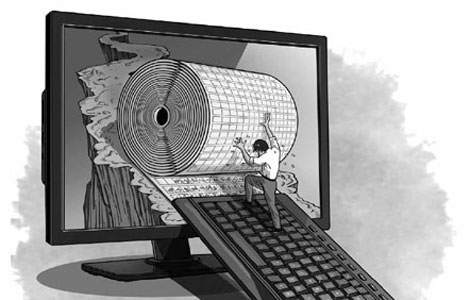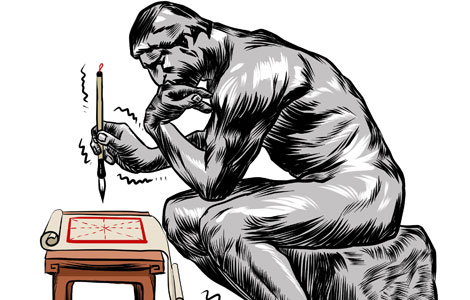Writers chase their authorial dreams online
Updated: 2013-10-10 07:41
By Yang Yang (China Daily)
|
|||||||||||
Testing readers' patience
Writers such as Yang Hao and Zuo are among millions producing novels at a combined rate of trillions of characters per day. The subjects range from history to romance, fantasy and struggles against officialdom, but the huge number of works and the uneven quality is beginning to test the patience of readers.
"I have read very few online novels. Of course, I know that there are many great writers, but life is just too short for me to be brave enough to sort the few good ones from the zillions of bad ones," said Chen.
"For me, online literature is created largely to please online readers, so sensationalist elements are employed to attract more attention. The 'best' works are usually picked by readers. However, they are not the ones I trust, and the deliberate application of sensationalist elements is not what I appreciate in a literary work," he said. "My happiness in reading relies more on the writers of The New York Review of Books, The London Review of Books or the reviews in the Oriental Morning Post. Canons left after being sifted by time are unlikely to be finished (by readers), so there is no time for online literature."
Sun Liyun, an employee in the human resources department of a State-owned company in Shanghai, used to spend a lot time reading online novels when she was studying at university.
"I am really a tolerant reader, but often even I can't stand the terrible plotting and characterization in many online novels," said the 25-year-old. "I prefer to read romances with very simple plots and fewer characters so I needn't bother to think."
She has read hundreds of online novels but there are few she could name as examples of good work. "Often, the plots and poems in online novels, especially of the time-traveling type, are plagiarized from Chinese classics or other novels. And some of the heroines are so ridiculously perfect and conceited that I just can't continue reading about them," she said.
Despite the generally low quality of online literature, there are still millions of people willing to pay to read it, which indicates the huge market demand.
The rapid spread and wide scope available on the Internet, especially with the development of mobile devices, make online literature an alluring market of tremendous potential.
In 2012, China had more than 230 million readers of online literature, a rise of 15.2 percent compared with the previous year, and more than 43 percent of users read online literature via mobile devices, according to the China Internet Network Information Center.
The Annual Report on Digital Publishing Industry in China: 2012-2013, published by the Chinese Academy of Press and Publications, said the income generated by e-books reached 3.1 billion yuan, 4.43 times higher than in 2011-12.
In September, Tencent, launched two online literature platforms, called Chuangshi and Yunqi, officially entering the cutthroat competition for market share among leading Chinese Internet portals, including Sina and Netease, the search engine Baidu and professional online platforms such as Cloudary. Tencent's platforms already have more than 8,000 writers on their books.
Today's Top News
Trending news across China on Oct 10
Foreign banks face hurdle in domestic market
Egypt court announces trial for ex-president
China hits at NASA's conference ban
Wealthy shift focus to investment: Survey
Bo Xilai to appeal life sentence
Premier Li proposes ASEAN plan
Libyan PM kidnapped from hotel
Hot Topics
Lunar probe , China growth forecasts, Emission rules get tougher, China seen through 'colored lens', International board,
Editor's Picks

|

|

|

|

|

|






